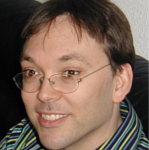
Stephen Eglen
SSI fellow
Reader in Computational Neuroscience, Department of Applied Mathematics and Theoretical Physics, University of Cambridge
Interests
I use computational methods to analyse and simulate the development of the nervous system, in particular the visual system. Together with the international neuroinformatics coordinating facility (INCF), I am investigating ways to encourage code sharing and reuse in neuroscience.
Research
I study the mechanisms that guide development of the central nervous system. In particular, I build theoretical models to help understand and predict the processes that underlie the early development of the visual system. I also generate new computational techniques to analyse the large volume of experimental data collected by studies of spontaneous activity patterns in the nervous system. A common theme in these ongoing research projects is their collaborative nature. Close partnership with leading international neurobiologists ensures my work is grounded by sound biological data. Ongoing research projects include:
1. High-throughput analysis of multi-electrode array recordings. We are developing methods for the automated analysis of spontaneous neuronal activity. We are screening the activity of developing networks from mice with genetic and pharmacological perturbations.
2. Development of standards for sharing of electrophysiological recordings. Sharing data within neuroscience is hindered partly by
the lack of standard formats for storing data and meta-data. We are currently evaluating HDF5 for storing data and minimal meta-data.
3. Evaluating 'competing' models to explain the development of topographic maps. Since the 1970s there have been many theoretical models proposed to account for the development of ordered connections. We have developed a quantitative framework for comparing these models under different experimental conditions.
4. Modelling the spatial distribution of neurons. Within a neural sheet, neurons are often spatially distribution non-randomly. We are quantifying and modelling these patterns as a way to understand developmental mechanisms underlying their formation.
Online Presence
Papers and further details about my work are available on my webpage.
Check out contributions by and mentions of Stephen Eglen on www.software.ac.uk
